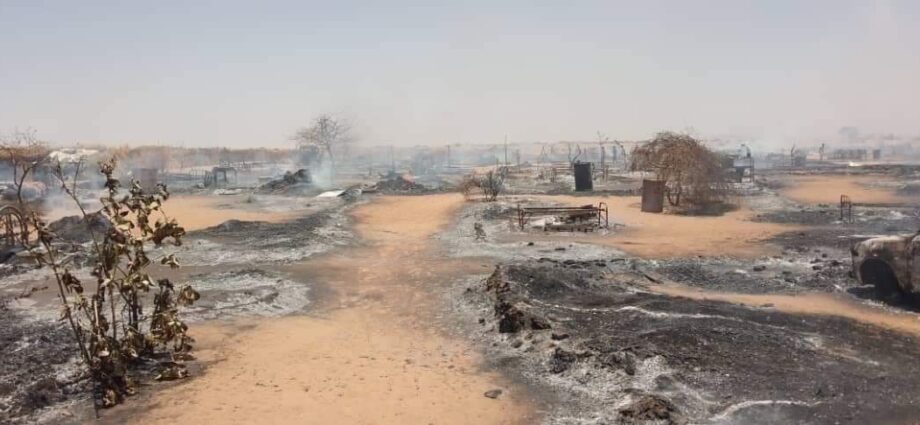April 13, 2024
Darfur24
Human Rights Watch HRW on Saturday called on global and regional leaders currently meeting in Paris to highlight Sudan and commemorate the first anniversary of the bloody conflict between the Sudanese Armed Forces and the Rapid Support Forces, to ensure that those responsible for the ongoing atrocities and violations of international humanitarian law are held accountable. .
Violations include widespread deliberate killing of civilians, unlawful attacks on civilian infrastructure, and deliberate obstruction and looting of aid, acts that constitute war crimes, according to Human Rights Watch.
Today, France, Germany, and the European Union are organizing a humanitarian conference on Sudan to press for an end to the fighting, and to increase global funding for the humanitarian response as the hunger crisis worsens in Sudan.
“The global response to the bloody conflict in Sudan must change,” said Mohamed Othman, Sudan researcher at Human Rights Watch. Leaders meeting in Paris must take action to address shameful low levels of humanitarian funding, including for local responders, and commit to concrete measures against those who deliberately obstruct the delivery of aid. To populations in need.”
He added, “The world should be ashamed of the horrific cost of its failure to respond. Civilians in Sudan deserve to see a strong, coordinated global response.”
He stated, “The Paris conference should not be the end of the focus on Sudan, but rather the beginning towards a new approach. “The conference should announce significant increases in humanitarian funding that include local responders, and set clear benchmarks and concrete measures that countries will take to end the use of aid as a weapon by the warring parties.”
Violations by both parties
Human Rights Watch said that both warring parties committed serious violations of international human rights law and international humanitarian law, in some cases amounting to war crimes and other atrocity crimes.
It confirmed that the Sudanese Armed Forces unlawfully killed civilians, carried out air strikes that deliberately targeted civilian infrastructure, and repeatedly obstructed humanitarian aid, among other violations.
In contrast, the Rapid Support Forces carried out widespread killings of civilians, many of which appear to have been ethnically targeted, especially in West Darfur, and also obstructed aid through methods that included widespread looting of humanitarian supplies. It also used heavy explosive weapons in densely populated areas and engaged in acts of sexual violence and widespread looting.
Both sides and their allies also recruited children and arbitrarily detained civilians, according to Human Rights Watch.
Human Rights Watch said that authorities affiliated with the Sudanese Armed Forces, including military intelligence, imposed many arbitrary bureaucratic restrictions that hindered the work of humanitarian organizations and their ability to reach those in need.
This includes delays, refusals and non-response to requests for visas and travel permits, which the authorities require relief workers to obtain to move between federal states, and the imposition of excessive administrative procedures to import and transport relief materials.
The Sudanese Armed Forces’ illegal obstruction of aid comes after decades of hostility and routine obstruction of international relief agencies under former Sudanese President Omar al-Bashir, adding to the suffering of residents in conflict areas, according to Human Rights Watch.
She pointed out that the Rapid Support Forces and their allied militias repeatedly attacked aid supplies and humanitarian infrastructure, especially warehouses, such as stocks in the World Food Program warehouse in Wad Madani in December 2023.
Both parties, especially the Sudanese Armed Forces, have sought to restrict aid going to and through areas controlled by the warring parties, putting Khartoum under effective siege since late 2023, and also impeding the arrival of aid to Darfur.
She stressed that the warring parties’ blatant disregard for international humanitarian law and international human rights law has caused the current catastrophic humanitarian situation and caused suffering to civilians in areas severely affected by the fighting, especially Khartoum, other cities and large parts of Darfur, and deprived them of basic necessities.
It stated that the attacks by the warring parties, including those that targeted infrastructure such as health care facilities and water treatment plants, made the lives of civilians unstable and unsafe.
Human Rights Watch called on the UN Security Council and member states of the African Union’s “Peace and Security Council” to continue scrutinizing the food security situation, by holding regular public briefings over the next six months.
It also called on the United States, Britain, the European Union and other countries to coordinate action under their respective sanctions regimes on Sudan, and to urgently identify the entities and individuals responsible for obstructing aid and other serious violations.
“Governments meeting in Paris must also actively and publicly support efforts to investigate ongoing violations on the ground,” she said.
The Independent International Fact-Finding Mission in Sudan, established by the UN Human Rights Council last October and charged with investigating violations across Sudan, including those committed in Khartoum and Darfur, should be given full support and access, and renewed as needed. Until the investigations are completed.

